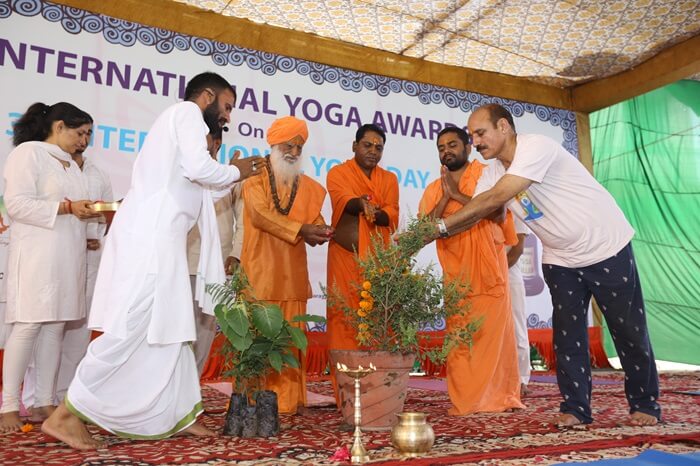Celebrating Diwali at Rishikul Yogshala: A Fusion of Tradition and Yoga

The festive season of Navratri culminates with Diwali, a celebration of Goddess Shakti, during the Indian month of Kartik (October-November). This year, Rishikul Yogshala embraced the spirit of Diwali, joining in the communal joy and festive atmosphere that fills India during this time.
As a leading yoga teaching organization in India, Rishikul Yogshala seized the opportunity to share the significance of this age-old ritual and its connection to spiritualism and yoga with its international students and followers.
Mythological Origin and Symbolic Value of Diwali

Diwali, or Deepawali, translates to a “row of light,” symbolizing the auspiciousness and divine glory believed to surround us. Across India, different deities are honored during Diwali, each associated with significant mythological events. The festival commemorates the holy union of Goddess Lakshmi, the symbol of fortune and wealth, with Lord Vishnu, the universal creator. In other regions, Diwali celebrates Goddess Kali, the destroyer of evil, and the return of Lord Rama to his kingdom after vanquishing the demon king Ravana.
These stories are rich with symbolic meaning that resonates with yogic philosophies. The integration of the Transcendental with the material world and the triumph of good over evil are core spiritual concepts reflected in Indian social celebrations, religious rituals, and daily life.
Celebrations Invoking Auspiciousness

Rishikul Yogshala made Diwali memorable by adorning its premises with brilliant lights. Students, teachers, and staff came together to light countless diyas (earthen oil lamps) after nightfall. This illumination is believed to dispel evil and invite positive energy into the lives of yogic practitioners. Following Indian traditions, rangoli designs made with colored powders were created, featuring auspicious symbols, flowers, and birds.
The festivities also included a havan (fire ceremony), where offerings were made to the sacred fire, accompanied by the chanting of mantras. This ritual offered a transformative experience, deepening participants’ spiritual connection.
The evening concluded with a spectacular display of fireworks, lighting up the sky and symbolizing the triumph of love, peace, and joy over darkness.
Conclusion
Celebrating Diwali at Rishikul Yogshala provides a unique blend of cultural immersion and spiritual growth. By participating in these traditional festivities, students and practitioners deepen their understanding of the profound symbolic meanings that align with yogic philosophies. The fusion of yoga and Diwali rituals enhances the spiritual journey, offering a holistic experience of love, peace, and joy.
To explore more about these enriching practices and the benefits of yoga, consider our Yoga Teacher Training in India. For a deeper dive into comprehensive training, check out our 300-hour Yoga Teacher Training in India or our 500-hour Yoga Teacher Training in India. Additionally, discover the holistic approach of our Ayurveda Retreat in India and unwind with a rejuvenating Yoga Retreat in India. Embark on a transformative journey that combines tradition with modern yoga practices, enhancing your path to holistic well-being.















